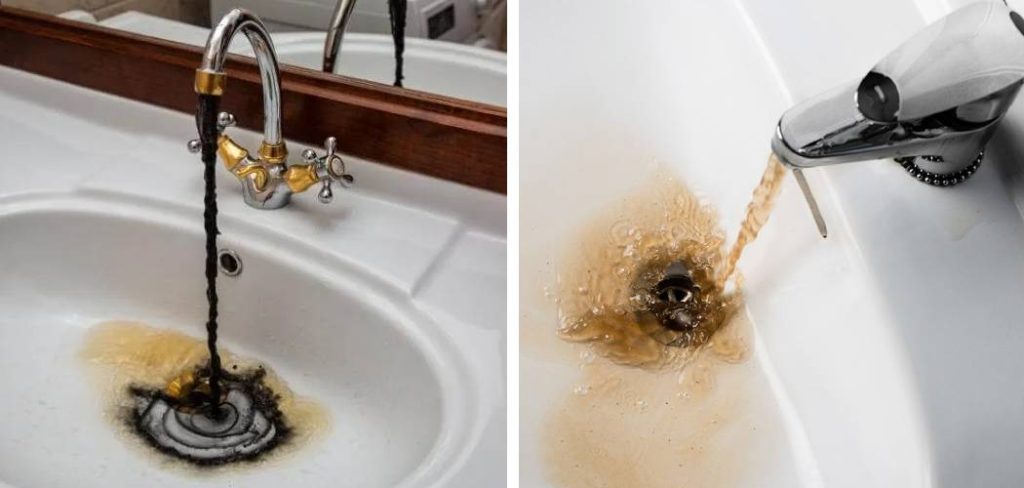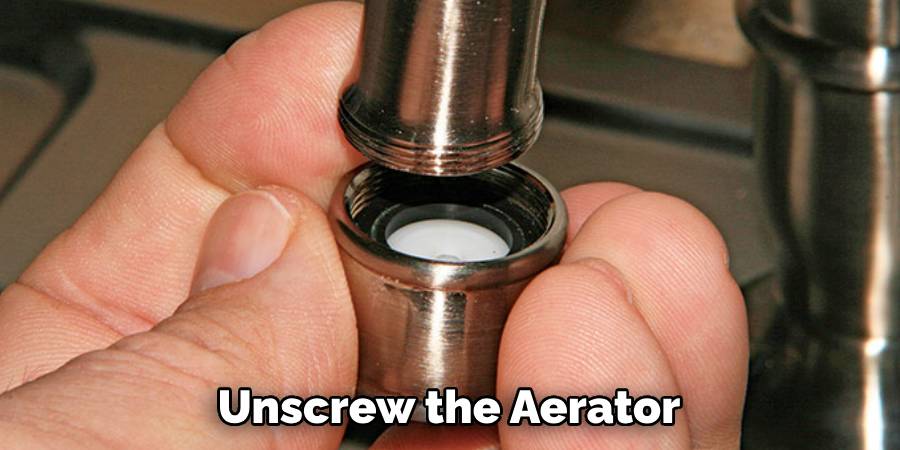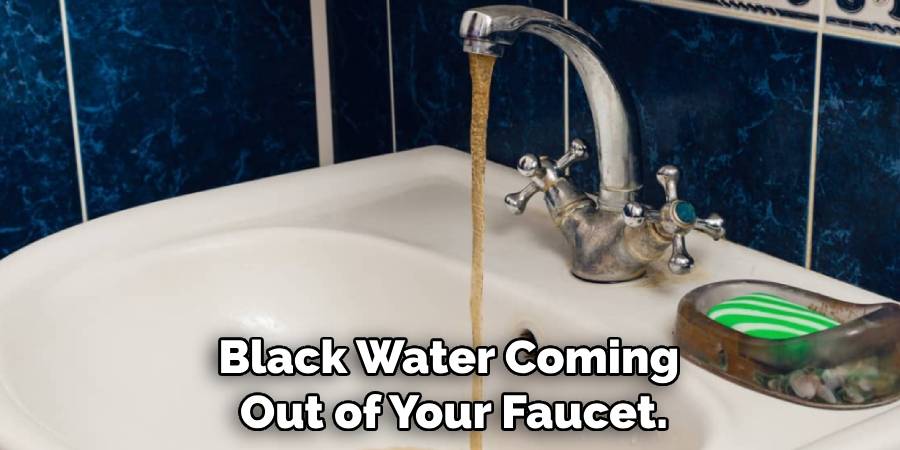Water is an essential part of our lives, and we rely on it for almost everything. From staying hydrated to washing dishes and cooking meals, water plays a vital role in our daily routines. So, when something goes wrong with the water supply, it can be a cause for concern.
One common issue that homeowners face is black water coming out of their faucets. This can be alarming and even dangerous, as black water is often contaminated with harmful substances. If you’re experiencing this problem, don’t panic. In this guide, we’ll discuss how to fix black water coming out of faucet.

What Does It Mean When Black Water Comes Out of Your Faucet?
Black water coming out of your faucet is a sign that there is a problem with your plumbing system. It can also indicate issues with the main water supply or the pipes in your home. The color of the water could range from light brown to dark black, and it may have an unpleasant odor.
The most common cause of black water is a build-up of minerals or sediment in your water heater. When this build-up breaks loose, it can discolor the water coming out of your faucet. In some cases, black water may also contain rust particles from old or corroded pipes.
9 Steps on How to Fix Black Water Coming Out of Faucet
Turning on your faucet and finding black water flowing out is a situation that can prompt panic. However, before you call a plumber and start worrying about the worst-case scenarios, there are essential steps you can take to troubleshoot and even resolve the issue on your own. Here’s a comprehensive guide presented in a listicle format to help you through this alarming moment.
1. Do Not Panic and Stop Using the Water
The sight of black water coming out of your faucet can be a shocker, but the key is to stay calm. Panic might lead to hasty decisions or overlooking potential causes. Once you notice the water discoloration, avoid using the tap water for drinking, cooking, or even washing your face and hands. Take a deep breath and move on to the next step.

2. Identify All Water Sources
Take a walk around your home and turn on various faucets and water sources, including the shower, bathtub, and outdoor hose. The goal is to determine if the issue is isolated to a single faucet or present throughout your plumbing system. This information will be valuable for diagnosing the problem.
3. Check the Water Heater
The water heater is a common culprit for discolored water. If black water comes out of both hot and cold taps, then your water heater is likely the issue. Drain a few gallons of water from the bottom of the tank to see if the black water clears. If it persists, contact a professional to inspect and potentially replace your water heater.
4. Run Cold Water for 15 Minutes
If the black water is isolated to one faucet, such as the kitchen sink, run the cold water for at least 15 minutes. Check the water periodically to see if the color returns to normal. This can sometimes flush out any sediments that may have accumulated in the pipes.
5. Inspect and Clean the Aerators
Aerators on faucets can trap debris that may be causing the water to turn black. Unscrew the aerator from the end of the faucet and clean the screen and components. Be cautious to clean in a container or the sink with a stopper to prevent debris from falling further into the plumbing system.

6. Test the Water With Bleach
In cases where the water coming out of the faucet remains black after flushing or cleaning, a simple bleach test can help determine the presence of organic material or algae. Add a few drops of household bleach to a small cup of water and mix. If the water turns a yellow or clear color, the black color may have resulted from organic growth. However, do this only as a preliminary test, as bleach is not a solution to the problem and can be hazardous.
7. Check for Corroded and Deteriorated Pipes
Inspect all accessible piping for signs of corrosion, rust, or deterioration. Black water can indicate that the protective pipe coating or inner layers have degraded, leading to metal leaching into the water. If you find that a section of your plumbing shows signs of damage, it’s crucial to have a professional evaluate and, if necessary, replace the affected pipes.
8. Investigate Local Utility Notices
Sometimes, water discoloration can be the result of changes in local water supplies, such as repairs to municipal water mains that may stir up sediment. Check for any notices or alerts from your local water provider. If there’s planned maintenance or work in the area, the discoloration may be temporary.
9. Call a Professional

If the black water persists and you can’t determine the cause, it’s time to contact a licensed plumber. They will have the expertise and tools to diagnose the problem accurately. In some cases, you may need to have your water tested for contaminants, which can be done by a professional service or your municipality.
Remember, your health and safety come first. It’s always better to err on the side of caution and seek professional help if you’re unsure about the water’s safety or the nature of the issue. With these steps, you will be well-equipped to handle the situation if you find black water coming out of your faucet.
5 Things to Consider to Prevent Black Water From Coming Out of Your Faucet
While black water coming out of your faucet can be alarming, there are measures you can take to prevent this issue from occurring in the first place. Here are five things to consider:
- Regular Maintenance: Ensure that your plumbing system is regularly inspected and maintained by a professional plumber.
- Replace Old Pipes: If your pipes are old and corroded, it may be time to invest in replacing them with newer, more durable materials.
- Flush Your Water Heater: To prevent mineral build-up in your water heater, it’s recommended to flush it at least once a year.
- Install a Water Filtration System: A water filtration system can help remove impurities and sediment from your water, preventing discoloration and potential health hazards.
- Be Aware of Local Water Issues: Keep yourself informed about any changes or alerts from your local water provider that may affect the quality of your tap water.
By taking these preventive measures, you can reduce the likelihood of black water coming out of your faucet and ensure the safety and quality of your tap water. Remember, staying proactive and addressing potential plumbing issues early on can save you time, money, and peace of mind in the long run. So be mindful of your water usage, stay informed, and don’t hesitate to seek professional help when needed. With these steps, you can keep your tap water clean and clear for everyday use.

Frequently Asked Questions
How Do You Fix Black Tap Water?
Imagine turning on your faucet, expecting a crystal-clear stream of life-giving water, but instead being confronted with a murky, dark flow that looks more like something out of an apocalyptic wasteland than a household tap. The sight of black water gushing from your faucet can spark a sense of alarm, perplexity, and a frantic search for answers. Fortunately, black tap water, although unsettling, is often caused by a manageable issue, such as the presence of minerals, sediment, or corroded pipes.
Addressing this unwelcome surprise starts with identifying the culprit. Whether it’s a simple fix like replacing a worn-out washer or requires the intervention of a professional to handle corroded plumbing, understanding how to fix black water coming out of faucet is paramount to restoring the sanctity of your home’s water supply and your peace of mind.
Why is There Black Stuff Coming Out of My Sink Faucet?
The black stuff emerging from your sink faucet can be alarming, and it often indicates the presence of mold, algae, or mineral deposits within your plumbing system. These contaminants can accumulate over time, especially in areas that are consistently damp and receive minimal sunlight, such as under the sink. Another common cause is the degradation of the faucet’s components, particularly rubber washers and seals, which can disintegrate and mix with the water, creating a black appearance.
Conducting a thorough cleaning of the aerators and fixtures, and inspecting for any worn-out parts for replacement, can significantly reduce the occurrence of such issues. However, if the problem persists, it may be necessary to consult a professional plumber to examine your home’s internal plumbing for deeper issues that might be contributing to the problem.
What is the Black Stuff Coming Out of Tap Water?
The black stuff coming out of your tap water can be a variety of contaminants, including minerals, sediment, or bacteria. These substances can enter your plumbing system through a variety of means, such as corroded pipes, sewage backups, or changes in the local water supply. Additionally, certain types of algae and other organic matter can thrive in stagnant water and cause discoloration.
To determine the specific cause of the black stuff in your tap water, it’s best to consult a professional plumber who can conduct tests and identify any potential health hazards. It’s always important to address this issue promptly to ensure the safety and quality of your tap water for everyday use. So don’t hesitate to seek professional help if you notice any changes or issues with your tap water. Knowledge is power, and staying informed can help you maintain a clean and safe water supply for your household. So keep these FAQs in mind and take proactive steps to prevent black water from coming out of your faucet.

Conclusion
In this guide, we’ve discussed about how to fix black water coming out of faucet. Remember, regular maintenance, staying informed about local water issues, and installing a water filtration system can help prevent this issue from occurring. If you do encounter black water in your tap, be sure to consult a professional plumber for accurate diagnosis and timely resolution. By taking these steps, you can ensure the safety and quality of your tap water for yourself and your loved ones. So stay vigilant, informed, and don’t hesitate to seek help when needed. Let’s keep our tap water clean, clear, and safe for everyday use. Happy plumbing!
